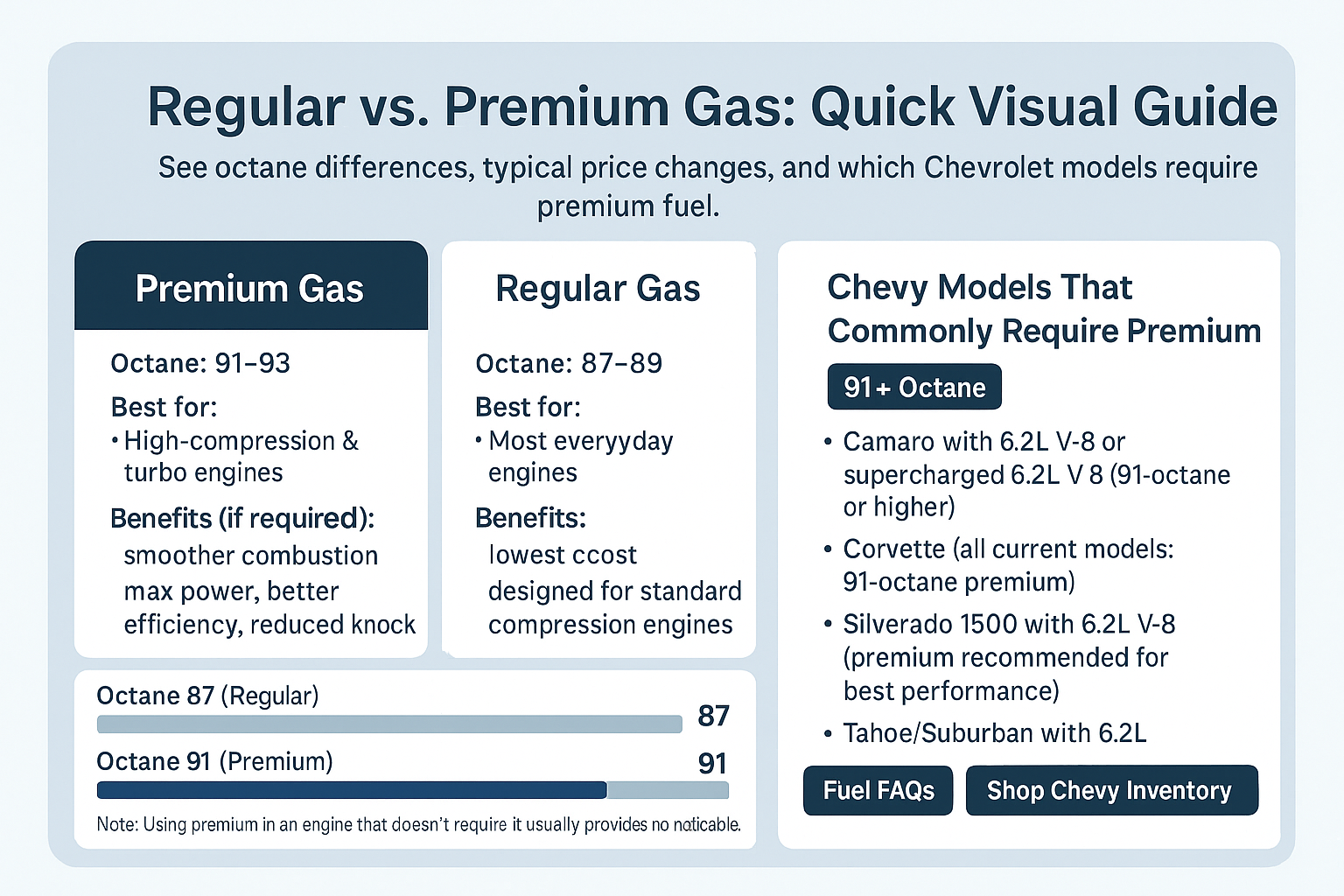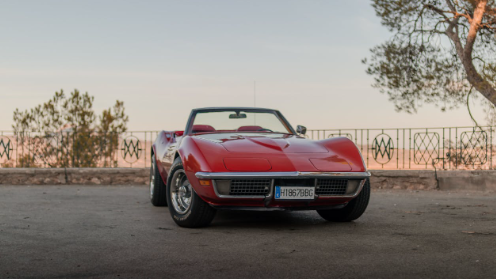When you pull into a gas station in the Kirksville, Missouri, area, you'll see various fuel options with different numbers on the pumps. You might wonder what these numbers mean and how regular gas differs from premium. If you own a Chevrolet that needs premium fuel, using the right type can boost its performance and fuel efficiency. Not sure if your Chevy needs premium? Read on to discover the differences between regular and premium gas, why some cars require high-octane fuel, and which Chevy models need it.
Are you shopping for a new Chevy too? Visit Kirksville Motor Company to explore our comprehensive selection. Our sales team is ready to help you find the perfect vehicle and answer any fuel-related questions.
Understanding Fuel Requirements for Chevrolet Models
The impact of fuel quality on Chevrolet's performance can be significant. For most vehicles, regular gasoline is sufficient because their engines are calibrated to run optimally on this fuel type. However, certain Chevrolet models, particularly those with high-performance or turbocharged engines, are designed to use premium gasoline.
These high-performance engines have high compression ratios, requiring fuel with a higher octane rating to prevent engine knocking. Engine knocking happens when the fuel-air mixture in the engine's cylinders detonates prematurely, causing a knocking sound and potentially leading to severe engine damage over time. With its higher octane rating, premium gasoline resists premature detonation, allowing these engines to run smoothly and efficiently.
Moreover, using premium gas in engines designed for it can help achieve better fuel economy. While a vehicle not designed for premium fuel won't see any significant benefits from using it, engines that require high-octane fuel will perform more efficiently and consume less fuel, ultimately saving on fuel costs in the long run.
Chevrolet Premium Gas Models
Are you wondering if your Chevrolet requires premium fuel? While most Chevy vehicles are designed to run on regular unleaded gasoline, certain high-performance models and those with upgraded engines need premium gas for optimal performance. Here are the models that should use premium fuel.
Chevrolet Camaro
Not every Camaro needs premium gas, but models with a 6.2-liter V-8 engine or a supercharged 6.2-liter V-8 do. Chevrolet recommends using 91-octane or higher for these versions. Camaros with smaller engines can use regular 87-octane unleaded gas.
Chevrolet Corvette
All new Corvettes should be filled with 91-octane premium gasoline. If you hear an engine knocking, even with premium fuel, it might indicate a problem that needs professional attention. Our experienced technicians can diagnose and resolve any issues.
Chevrolet Silverado 1500
Premium gasoline is recommended for any Silverado 1500 equipped with a 6.2-liter V-8 engine to ensure the best performance. If premium fuel is unavailable, you can use regular unleaded, but it may slightly reduce the truck's performance and drivability. Other Silverado 1500 models with smaller engines can use regular gas without any issues.
Benefits of Premium Gasoline in Cars
Using premium gas in your Chevrolet, especially for luxury, sports, or performance models, offers several key advantages:
- Improved engine performance**:** Premium gas's higher octane levels reduce engine knocking, ensuring smooth combustion in high-compression engines.
- Maximized power output**:** Turbocharged engines achieve maximum horsepower with premium gas, enhancing acceleration and overall performance.
- Enhanced fuel efficiency**:** Premium gas can improve fuel efficiency in vehicles that require it, providing more miles per gallon and saving money over time.
- Engine longevity**:** Premium gas prevents engine knocking, reducing the risk of significant engine damage and costly repairs, thereby extending engine life.
- Lower emissions**:** Vehicles designed for premium gas emit fewer pollutants, making them more environmentally friendly.
Higher-quality additives**:** Premium gas often contains better additives, keeping your engine cleaner and running smoothly.

Fuel Types Explained: Regular vs. Premium
When filling up your Chevrolet, you'll notice different gas pump numbers, usually 87 to 91. These numbers represent the fuel's octane ratings. Here's a breakdown of the differences between regular and premium gasoline with different numbers.
Octane Rating
Regular gas typically has an octane rating of 87 or 89, suitable for most engines with low compression ratios, as it ignites easily and burns quickly. Meanwhile, premium gas usually boasts an octane rating of 91 or higher, up to 94, reducing the likelihood of pre-ignition and engine knocking. It is ideal for high-compression engines found in performance and luxury vehicles.
Engine Suitability
Regular gas works well in engines with low compression ratios and is designed to run efficiently in most standard vehicles. On the other hand, premium gas is recommended for engines with high compression ratios, such as those in sports cars and turbocharged engines, requiring higher octane levels to prevent knocking and operate at peak performance.
Price
Regular gas is generally more affordable, costing 20 to 40 cents less per gallon than premium gas. However, with its higher octane rating, premium gas commands a higher price due to its necessity for maintaining optimal performance and longevity in specific high-performance engines.
Premium Gas FAQs
Does the Camaro Need Premium Gas?
Only Camaros with the 6.2-liter V-8 or supercharged 6.2-liter V-8 engines need premium gas (91-octane or higher). Other models can use regular gas.
What Are the Chevrolet Corvette fuel requirements?
All Chevrolet Corvettes should use 91-octane premium gasoline to prevent engine knocking for optimal performance.
What Are the Fuel Recommendations for Chevrolet SUVs?
Premium gasoline is recommended to maintain optimal performance for Chevrolet SUVs, like the Tahoe or Suburban, that are equipped with a 6.2-liter engine.
What Is the Chevy Malibu Gas Type?
The fuel type for Chevy Malibu depends on the model and engine. It ranges from regular 87-octane to premium 93-octane.
Optimizing Your Chevrolet's Performance With the Right Fuel
Using the correct fuel is necessary to maintain your Chevrolet's performance, efficiency, and longevity. With its higher octane levels and superior additives, premium gas ensures smoother combustion, maximized power, and better fuel efficiency. For high-performance and turbocharged engines, premium fuel prevents engine knocking and reduces the risk of long-term damage, ensuring your Chevrolet runs at its best for years. Follow Chevrolet's fuel recommendations to keep your vehicle running smoothly. If you have any questions or need service, contact Kirksville Motor Company. We are committed to helping you maintain your vehicle perfectly.
Red Chevrolet Corvette on Road by Audrius Strikaitis is licensed with Pexels License



